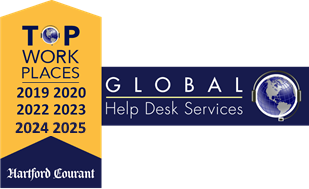You’ve decided an outsourced help desk is your best option. Great!
Now what?
Well, now it’s time to choose the type of IT help desk you need. And here’s the rub: it might not be as straightforward as you think. It can be hard to tell at first if the company you’re interested in is a boutique help desk provider, a managed service provider, or a large enterprise solution.
So, what should you look for, and how will you know what the best fit is for your organization?
When choosing a help desk, you’ll want to look at three main things:
- Focus
- Flexibility
- Cost
A focused help desk specializes in help desk services—their attention isn’t divided among a host of other services.
A flexible help desk can adapt to fit your needs instead of making you adapt to their existing processes and offerings.
And while cost might be a determining factor for you, it’s important to know what you’re getting for that price tag.
Below, we’ll break down the pros and cons of each type as well as some things to consider when you make your selection.
Ready? Let’s dive in.

Types of IT Help Desk Services
There are a lot of different kinds of help desk providers, but they mainly fall under three main categories.

Boutique Help Desk Providers
Focus: A boutique help desk provider, like GHDSi, only provides help desk services. This usually means they put more effort and resources into those services than a company who also offers data management and cloud services. Typically, that translates into more attention to your needs and a better experience for your callers. The downside? Again, they only provide help desk services, so depending on your needs, you may need to pull in additional service partners.
Flexibility: Because a boutique help desk isn’t trying to do 100 other things, they can more easily adapt to your needs. Have an issue with an existing process? A focused, dedicated help desk can adapt to change more quickly than a larger company with more rigid processes.
Cost: The price you’re quoted for a boutique help desk like GHDSi might be a bit higher than some other providers, but there are a few important things to consider about that price tag. First, it will be transparent. Unlike companies who provide a bevy of other services, there’s no hidden costs or upselling. You’ll know what you’re paying month-to-month before you sign a contract. And because they only offer help desk services, they won’t quote you a low price then try to upsell you on additional services.
Read more: Choosing Outsourced Help Desk Services: Red (and Green!) Flags to Look For

Managed Service Providers (MSPs)
Focus: A managed service provider is a one-stop-shop. They provide a variety of services, from IT security to VoIP and software deployment. And for some companies, that can be an attractive proposition — dealing with one point person is usually easier than dealing with five. There is a downside, though: If a provider only makes 10% of its money from a service, they may only give it 10% of their attention. That could cause big problems for you, if they view your organization as a small fish in their large pond. Can you get a problem addressed in a timely manner? Do they train their agents well enough to provide the level of service you need? Are they only local to one of you offices?
Flexibility: Because help desks aren’t an MSP’s bread and butter, they might not offer a lot of options. Often, you’re asked to choose from a set of standard service packages. That can leave you in a pickle if those offerings don’t fit your unique needs. For example, let’s say your company is planning an expansion overseas. Suddenly, you need five more hours of coverage for customers in the UK. If the MSP doesn’t offer expanded hours — or makes you move up to 24/7 coverage you don’t need — you’re left overpaying or settling for less.
“Providers say ‘Yeah, we can work with you.’ Then when you start to actually talk to the support team, you see that there’s certain things that they can’t budge on, and it doesn’t always work out like they first pitched.” — Corporate Services Manager at a transportation company
Cost: Because of the ability to bundle services and work at an economy of scale, MSPs can usually offer very competitive pricing. Just make sure you pay careful attention to the agreement to watch for hidden costs. Some providers might bundle your help desk costs with other services you don’t need, try to upsell you on other services, or charge you à la carte for services you thought would be included.

Large Enterprise Solutions
Focus: Like MSPs, large enterprise solutions offer a big variety of IT services designed to meet the needs of larger corporations. These tend to be the long-standing industry giants that most everybody has heard of. And when choosing the best IT help desk for your needs, you may face some internal pressure to sign with them. (As the saying goes, “No one ever got fired for buying IBM.”) But those brands aren’t immune from some of the same issues that MSPs face. With their hands in so many pots, they might lack the focus you and your callers need. If help desk services are a tiny fraction of your larger contract, they’ll probably get a tiny fraction of the provider’s attention as well.
Flexibility: These big brands also come with their own rigid operational playbooks. That can leave you in much the same position as an MSP: choosing from an existing menu of options instead of getting a solution customized to your needs. And if you need a change halfway through your contract, you might have to go through layers of management and approvals to make it happen. Unlike a smaller provider, they don’t have the flexibility to adapt to your evolving needs quickly.
Cost: Much like an MSP, you might pay an attractive price for a large enterprise solution, but there could be hidden costs.

Key Considerations for Your Best IT Help Desk Experience
If you’re deciding on a help desk, you’ve got a lot to consider. Here are some questions to ask the provider, your internal team, and yourself.
Specialization vs. Generalization
- How dedicated is the provider to help desk services?
- How might their level of focus affect the quality of service and customer satisfaction?
Flexibility and Customization
- Will the provider create a plan customized to my needs, or do I have to choose from an existing menu?
- How easy is it for the help desk to adapt to my needs throughout the contract?
- How rigid are their processes and service structures? What risks do I face because of this level of flexibility?
Pricing Models
- What pricing structure do they use: per call, per user, or flat rate?
- Are there hidden costs to consider?
- How does the price compare to competitors? If it’s too low, what am I sacrificing?
Read more: IT Help Desk Outsourcing Pricing Models Comparison
Customer Support and Experience
- What is the quality of their service like? Are customer reviews and testimonials available? Can I contact current or former customers to ask questions myself?
- How are the agents trained? How experienced are they in my field?
- How important are first-level resolution rates to this company? Will they escalate too many calls to inflate my costs?
Why GHDSi Stands Out
As a boutique IT help desk, GHDSi brings a lot of benefits to the table.
Focused expertise: Help desks are all we do. We don’t split our attention between dozens of other offerings. Our sole focus on IT help desk services means you get the customer experience you and your callers expect — and our undivided attention when you have an issue.
And our robust, ongoing training means you’ll get agents who are familiar with how to solve your callers’ unique problems, quickly.
“They have the aptitude to deal with our user base — Very good communication, which is critical to success. With GHDSI "It's night and day. We cannot even compare it. “—Corporate Services Manager at a transportation company
Read more: 6 Ways to Level Up Your Help Desk Training
Flexibility: We hate fitting square pegs into round holes. So, we don’t force your unique needs into an existing menu. After a thorough discovery, we create a solution customized to you. And if you need to change something, we have the freedom to adapt without impacting our other clients.
Transparent pricing: We’re competitively priced. And you’ll always know what you can expect to pay each month and what’s included in that bill. We won’t bundle in services you’ll never use or spring hidden charges on you later.
Amazing customer service: Consistency is our mission. So, whether your customers call at noon or midnight, they can expect the same outstanding customer service, efficient problem solving, and friendly support. And we pride ourselves on our high first-level resolution rate to keep escalations to a minimum.
“My users are thrilled with the level of detail and the nature of the attention they’re getting. They’re not being talked down to—it’s a partnership. And all of Global Help Desk Services’ levels of management are very responsive to us. They jump on any problem, follow up on the reporting requirements, and make the issue go away."-Director of Retail Systems at a leading furniture retailer
Choosing the Right IT Help Desk Doesn’t Have to Be Hard
Choosing the right kind of help desk can be tricky. There are a lot of options, they’re not all necessarily the right fit for your organization, and the last thing you want is to make the wrong decision.
So, as you’re going through the process, questions are key.
Look for a provider who asks a lot of questions about your business and help desk needs. And ask plenty of questions yourself to make sure you’re getting exactly what you think you’re getting before you sign on the dotted line.
And if you’re wondering, questions don’t scare us. We ask a ton of them throughout the discovery process so we can build a solution that checks all your boxes. And we welcome them from you, too. We want to make sure you and your callers are always happy.
So, if you have questions, don’t keep them to yourself. Fire away! We’re happy to answer them.


